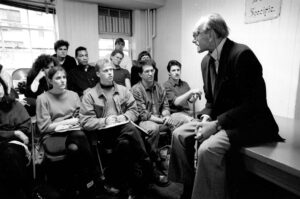

Useful Links
Contact
- The Bridge at Cecil Sharp House
- 2 Regent’s Park Rd, London NW1 7AY
- 020 7424 0860
- admin@thebridge-ttc.org
Social Media


Auditioning for a role is always a daunting task so you’ll want as much help as you can get. Here are some key audition tips you’ll want to follow to maximise your chances of success.
Be well-prepared
The more preparation you do the more confident you’ll be. Learn your lines so you can be “off-book”. You’ll want to know your lines like the back of your hand. Directors usually don’t like you changing the lines or improvising when you weren’t asked to. Read the entire script before the audition – not just the scene you’ll be performing. You’ll want to really understand your character and any other character you’re interacting with. Think about your character’s motivation and background. Also make sure you bring copies of your acting CV with you that includes your picture and contact details of you – and your agent if you have one. Warm up beforehand at home or in a quiet space – not outside the audition room.
Dress appropriately
Generally you should dress appropriately for the character you’re playing. For example, you could wear jeans and t-shirt if you’re playing a skateboarder, or a suit if you’re playing a businessman. Also only wear a full costume if you’re asked to in advance e.g. police uniform.
Be punctual
This may be an obvious audition tip but the importance of punctuality cannot be overstated. Actually showing up to the audition on time is the first opportunity to demonstrate that you are reliable, respectful, and professional. If you’re late, people may not want to work with you. When running auditions, shoots, or rehearsals a cascade of delays can be caused by just one actor showing up late. There is typically a strict schedule and they may only have the space available for a short time. Don’t cause them unnecessary stress. Leave home earlier to get to the area in good time and allow for transport delays. You can always wait in a nearby café if you get there too early. Generally though you want to aim to arrive at the audition 15 minutes early.
Play it right
Make sure your performance is appropriate and at the right level. Don’t be too loud if it’s a quiet sombre scene for screen. But be loud and clear if you’re trying to fill a theatre space.
Be the character and don’t force it. One common pitfall is to try and act too much – don’t over-emote without good reason. Be natural in your reactions and think about how the character would realistically behave.
Be open to notes
Even if you think you delivered a perfect audition performance, the director or whoever you’re auditioning for may have something different in mind and, ultimately, it’s them you’re trying to impress. They may ask you to repeat your performance in a different style or deliver a line in a new way. You need to show that you’re adaptable and willing to listen and learn.
Be courteous and polite
This applies to all stages of the audition process including during the communication before and after the actual audition. Don’t fret or mouth off if you’re not successful. Make sure to thank them for their time and consideration. There will typically be a lot of competition and all you can do is try your best. Often you may not be successful because you simply don’t have the look that the director is envisioning for their character. However, you may still be suitable for another role down the line so might get a call from them about another audition – but only if you were easy to get on with the first time round.
These audition tips only scratch the surface of what is required to be successful in an audition. The Bridge Theatre Training Company in London provides comprehensive acting training to help you ace your auditions and become a working professional actor.